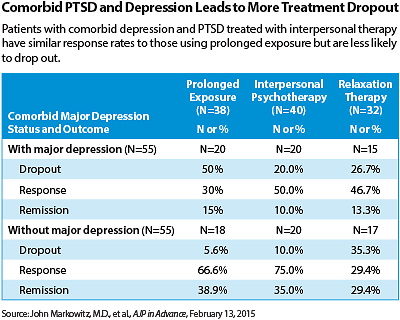A randomized trial of posttraumatic stress disorder (PTSD) treatments has found that interpersonal therapy (IPT) was “roughly equipotent” with exposure therapy, the current gold standard for treating the disorder.
Results of the new study suggest a useful alternative, assuming that it is replicated in larger and more diverse cohorts.
In 2008, the Institute of Medicine said exposure-based therapies for PTSD were the only ones for which there was good evidence of efficacy.
“These findings contradict the widespread clinical belief in PTSD therapeutics that patients require cognitive-behavioral therapy or exposure to trauma reminders,” wrote John Markowitz, M.D., a research psychiatrist at the New York State Psychiatric Institute and a professor of clinical psychiatry at Columbia University College of Physicians and Surgeons, and colleagues in the February 13 AJP in Advance. “We found what many have suspected: exposure therapy is valuable, but not a sine qua non.”
The researchers randomly assigned 38 participants to prolonged exposure therapy, 40 to interpersonal psychotherapy, and 32 to relaxation therapy. About half of each group had comorbid depressive disorder. The study sought to test whether IPT was “no more than minimally inferior to prolonged exposure.”
IPT produced improvements on the Clinician-Administered PTSD Scale (CAPS) that were only 5.5 points worse than exposure therapy, less than the 12.5-point threshold set in advance for inferiority. Response rates were also clinically better, although statistically nonsignificant.
“The results show that both exposure therapy and IPT are effective in treating PTSD to a similar degree, one that seems better than the control condition,” said Daniel Pine, M.D., chief of the Section on Development and Affective Neuroscience in the National Institute of Mental Health (NIMH) Intramural Research Program, in an interview with Psychiatric News.
“This is a particularly important study because it includes the gold-standard psychotherapy, exposure, plus a suitable control—relaxation therapy—and a therapy we usually think of as beneficial in depression, interpersonal therapy,” added Pine, who was not involved with Markowitz’s research.
IPT was developed to treat depression, possibly explaining the lower dropout rate among depressed patients treated with IPT compared with those receiving exposure therapy. Its mechanism of action likely differs as well.
“IPT may work through alternative attachment mechanisms involving emotional understanding, social support, and learning to cope with current life rather than confronting past traumas,” suggested Markowitz and colleagues. “Yet, in order to remit from PTSD, patients must eventually face their fears. As previously reported, patients who improved in IPT seemed to gain confidence in daily social interactions, gathered social support, and then spontaneously—without therapist encouragement—exposed themselves to trauma reminders.”
Thus, Pine said, the study expands the range of treatments that might be useful in treating PTSD.
The study was funded by NIMH. ■
An abstract of “Is Exposure Necessary? A Randomized Clinical Trial of Interpersonal Psychotherapy for PTSD” can be accessed
here.

